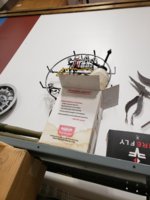First time I drove my '73 3.0CS about 15 miles I noticed the engine lugging like the brakes were all activated.
Then I stopped for about 1/2 hour at a store and all was normal. Another 15 miles and I'm now in 3rd gear trying to keep up with traffic. Then I lost all braking as my foot went to the floor. I found out the fluid had not been flushed in 13 years! Now the brake calipers and clutch slave have fresh Redline fluid and a few miles in the cool night and all is normal. The old fluid looked like it was 13 years old. Today I drove about 40 min and 10 miles to a shop and I could feel the engine lugging again. After about 30 minutes I drove home and the brakes were again normal until going about 10 miles,down-shifting at every light to keep off the brake pedal. The brakes locked up again and all 4 wheels were very hot. You could smell the brake compound. Has anyone had this problem? What's next? Master Cyl.? Booster? Proportioning valve? All 4 calipers were totally free when cold when I had the car up on the jack stands. And then all 4 were hot and locked up. And the brake pedal had very little play and was hard to press when the problem occurred. All suggestions are appreciated.
Then I stopped for about 1/2 hour at a store and all was normal. Another 15 miles and I'm now in 3rd gear trying to keep up with traffic. Then I lost all braking as my foot went to the floor. I found out the fluid had not been flushed in 13 years! Now the brake calipers and clutch slave have fresh Redline fluid and a few miles in the cool night and all is normal. The old fluid looked like it was 13 years old. Today I drove about 40 min and 10 miles to a shop and I could feel the engine lugging again. After about 30 minutes I drove home and the brakes were again normal until going about 10 miles,down-shifting at every light to keep off the brake pedal. The brakes locked up again and all 4 wheels were very hot. You could smell the brake compound. Has anyone had this problem? What's next? Master Cyl.? Booster? Proportioning valve? All 4 calipers were totally free when cold when I had the car up on the jack stands. And then all 4 were hot and locked up. And the brake pedal had very little play and was hard to press when the problem occurred. All suggestions are appreciated.

